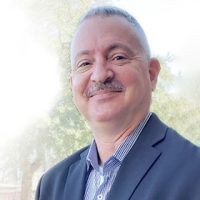Expert Panel:

Dr. William Wierda, President & CEO, CLL Global Research Foundation

Jeff Folloder, Moderator and CLL patient advocate
Our recent CLL Global Research Foundation virtual town hall featured CLL Global President, Dr. William Wierda, and Dr. Patrick Reville, Assistant Professor in the Department of Leukemia at The University of Texas MD Anderson Cancer Center. CLL patient advocate Jeff Folloder moderated the event. Watch the full webinar.
Transcript
Jeff Folloder:
I have another question for you that just came in from online. “At a previous CLL symposium, Dr. Nicole Lamanna said that if you do well with CAR T, you tend to do very well. But on the other hand, if you don’t respond to that treatment, it’s significantly less effective therapy.”
“I’ve also heard that the average remission from CAR T is only about two-and-a-half years. Do you find that to be correct generally, and what about the percentages of patients that do well with CAR T?”
Dr. William Wierda:
So, I have been involved in the Liso-cel trial for a long time. I don’t know that I would agree with Nicole. I respect Nicole and I love Nicole and she’s a great friend, but I don’t know that I would necessarily agree with what she’s saying. The Liso-cel trial and the data that we have presented thus far has been in patients who have failed a BTK inhibitor and venetoclax. That’s two agents, and those are the targeted agents that we have that have any reasonable activity, and patients have failed those. So, we’re talking about a very high-risk population of patients who are getting CAR T that have been reported on so far.
Now, the TRANSCEND 004 trial is a very large trial. There were other patients enrolled that we haven’t had a lot of information on yet, but we will probably in the near future. Patients who haven’t necessarily failed both treatments, but perhaps have failed only a BTK inhibitor or only venetoclax-based therapy.
We also have a cohort on that trial of Liso-cel plus ibrutinib, where the activity seemed to be very good when you are using it in combination with ibrutinib.
The patients who are doing very well on the Liso-cel that we’ve reported on so far are patients who achieve a complete remission, meaning all their lymph nodes are less than 1.5 centimeters, and their counts have improved. They may have not had full recovery of their counts, but they have had clearance of their marrow and their nodes are all down to 1.5 centimeters. That happens in about 20 percent of the patients. All of those patients have been MRD negative.
All of those patients that we’ve reported on so far have maintained in remission. They haven’t relapsed.
So, I think the data that we have seen so far has been, again, in a high-risk population, and the patients who respond do exceptionally well. There is some suggestion that there’s clinical benefit for patients who don’t get a complete remission. Patients who have a partial remission, and even those who have stable disease. But it’s not durable as it is for patients with a complete remission.
So, we need to see more data. We need to see more data from the TRANSCEND trial. We need more follow-up from that data. I think once we have some direction from the FDA in terms of approval, that information will come out for the trial.

